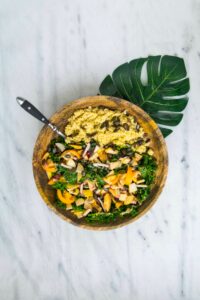Are you curious about gluten in couscous and its variations? Wondering if you can incorporate couscous into your gluten free lifestyle? Let’s unravel the mystery! In this guide, we embark on a fragrant journey to explore the questions on everyone’s mind – is couscous gluten free, is pearl couscous gluten free, and is pearled couscous gluten free.
Couscous is known for its flavor and is a favourite dish in kitchens everywhere. As more and more people adopt a gluten free lifestyle, it’s important to know if couscous can be a part of this diet.
The Essence of Couscous
The big star of the kitchen is Couscous, a tiny pasta that originated in North Africa but has become a global culinary favourite. It was made with crushed durum wheat semolina, which may raise questions about its compatibility with a gluten free lifestyle.
Understanding couscous varieties:
- Couscous comes in a variety of varieties, including two popular traditional couscous and a larger version called pearl couscous or pearled couscous
- Traditional couscous is made from small chunks of semolina, while pearl couscous are larger round objects.
Is couscous gluten free?
- Unfortunately, traditional couscous contains gluten because it comes from wheat semolina.
- Gluten levels are a concern for those following a gluten free diet.
Pearl couscous is also wheat-free, gluten free, and offers a similar concept for gluten free individuals. And for those looking for gluten free products, there are specific gluten free couscous products available in the market.

Ingredients within Couscous
Couscous, the culinary wonder, is not just a treat for the taste buds; it’s a fascinating blend of ingredients that forms those tiny, flavorful pearls.
At its core, couscous is crafted from semolina, a coarse wheat product. This is where the gluten concern arises, as wheat is a gluten-containing grain. The traditional couscous is, therefore, not inherently gluten free.
Pearl Couscous
Pearl couscous, also known as Israeli or pearled couscous, deviates slightly in its composition. It’s crafted from wheat flour and semolina, just like traditional couscous, but the pearls are more substantial and distinct. Despite these differences, the gluten factor remains, posing a challenge for those on a gluten free journey.
For those seeking gluten free alternatives, the quest continues. While traditional and pearl couscous contain gluten, fear not, for the culinary world has welcomed gluten free couscous variations.
Is Couscous Gluten free?
Are you wondering if couscous is a safe choice for a gluten free lifestyle?
Exploring Couscous and Gluten Compatibility
Couscous, a culinary favorite globally, adds a delightful touch to various dishes. However, when it comes to gluten, couscous has some considerations. Traditional couscous is crafted from semolina, a wheat product that contains gluten. This makes conventional couscous not suitable for those avoiding gluten in their diet.
Pearl Couscous and Gluten Content
Now, let’s talk about pearl couscous. Is pearl couscous gluten free? Unfortunately, the answer remains no. Despite its distinct shape and larger granules, pearl couscous is also made from semolina, putting it in the gluten-containing category. If you’re exploring gluten free alternatives, pearl couscous might not be your best choice. Similar to regular couscous, pearled couscous follows suit in containing gluten. The use of semolina in its creation makes it unsuitable for those following a gluten free diet. It’s crucial to be aware of these nuances to make informed choices about your dietary preferences.
What Makes Couscous Gluten free?
While traditional couscous is off the table for gluten free enthusiasts, fear not! Several gluten free alternatives offer a chance to savor couscous-like textures without compromising dietary needs.
Understanding Gluten in Pearl Couscous
Now that we’ve established that traditional couscous contains gluten, let’s take a closer look at its popular variant: pearl couscous. Is pearl couscous gluten free?
The Semolina Connection
Pearl couscous, also known as Israeli couscous or giant couscous, shares a common thread with its smaller counterpart—it is made from semolina, a wheat derivative. Unfortunately, this means that, like traditional couscous, pearl couscous contains gluten. The wheat origin and semolina composition remain consistent, posing a challenge for those seeking gluten free alternatives.
Key Considerations
For individuals navigating a gluten free journey, understanding the gluten content in different food items is crucial. Pearl couscous, despite its unique texture and versatility in dishes, falls into the gluten-containing category. If you’re exploring gluten free alternatives, it’s advisable to look beyond pearl couscous to ensure your dietary needs are met. While pearl couscous might not fit the bill for a gluten free diet, fear not! The culinary world offers a spectrum of gluten free alternatives that provide a similar mouthfeel and culinary experience.
Gluten free Swaps for Couscous
Let’s delve into gluten free alternatives for couscous. If you’re navigating the gluten free landscape and pondering, “Is couscous gluten free?”—you’re on the right track.
Is Couscous Gluten free?
No, traditional couscous contains gluten due to its wheat composition. But fear not; we’ve got a lineup of gluten free heroes to fill the couscous void.
Quinoa: Mimicking Perfection
Meet quinoa, the gluten free mimic of couscous. It closely resembles couscous in appearance, taste, and texture. Opt for certified gluten free quinoa for a worry-free culinary experience.
Sorghum: Hearty and Gluten free
Sorghum, a gluten free grain with a nutty essence, serves as a robust couscous substitute. Its hearty texture seamlessly steps into couscous-inspired recipes.
Short-Grain Rice: Simplicity Speaks
Short-grain rice, naturally gluten free, is a straightforward swap for couscous. While its texture may differ slightly, its adaptable nature makes it an easy transition.
Riced Cauliflower: Low-Carb Marvel
For those on a low-carb journey, riced cauliflower emerges as a gluten free champion. Accessible and neutral in flavour, it effortlessly transforms into couscous in various recipes.
Gluten free grains including brown rice, risotto rice, and buckwheat are wholesome alternatives and provide a haven for individuals with celiac disease, ensuring a worry-free dining experience when restaurants prioritize gluten free preparation practices.
Making Gluten free Couscous
Cooking gluten free couscous can be a piece of cake, even if you’re not a kitchen whiz. Check out these easy-breezy tips to make sure your gluten free couscous is a crowd-pleaser:
- Grab certified gluten free couscous from cool brands like Gefen, Streit’s, and Lieber’s. They’re all about that potato starch goodness in gluten free desserts.
- Stick to the recipes on the gluten free couscous packaging. It’s like a foolproof plan for keeping that perfect texture and taste intact.
- Treat gluten free couscous like your own edible canvas. Spice things up with herbs, spices, or a drizzle of olive oil. It’s the secret to giving your couscous a flavor kick.
- Turn your gluten free couscous into a full-blown feast by tossing in colorful veggies and your go-to protein. Yum and nutritious!
- Always double-check that your cooking gear is squeaky clean to avoid any accidental gluten rendezvous. Let’s keep that couscous strictly gluten free.
- After cooking, fluff up your gluten free couscous with a fork. It’s the little magic touch that makes it light and fluffy, begging to be devoured.
- Stash leftovers in a snug container in the fridge. Reheat when hunger strikes to keep that gluten free couscous feeling fresh.
- Mix and match your gluten free couscous with other awesome gluten free eats—like a roast, grilled chicken, or a crunchy salad. The perfect foodie dream team.
Cooking gluten free couscous is all about breaking the rules in the most delicious way possible. These tips will turn you into a gluten free couscous rockstar. Happy cooking!
How to Read Couscous labels for gluten
Navigating the grocery store aisles for gluten free couscous? Don’t worry; it’s like a culinary treasure hunt! Here’s your guide on how to decode couscous labels for that golden ‘gluten free’ stamp:
- Look for Certified Gluten free Brands:
Brands like Gefen, Streit’s, and Lieber’s offer certified gluten free couscous. Trust the label – it’s your gluten free passport!
- Check the Ingredients List:
Dive into the nitty-gritty of the ingredients. Potato starch is a hero here. If it’s there, your couscous is on the gluten free squad.
- Beware of Traditional Couscous:
Traditional couscous, made from wheat semolina, is the gluten villain. Steer clear if you’re on a gluten free mission.
- Explore the Pearl Couscous Section:
Pearl couscous, whether labeled ‘pearled’ or ‘pearl,’ should still meet your gluten free criteria. The pearls should glisten with gluten free goodness.
- Look Beyond Couscous Labels:
Sometimes, couscous might go incognito. Check broader labels like ‘gluten free grains’ for hidden treasures.
Now armed with label-reading wisdom, embark on your gluten free couscous journey with confidence. Happy hunting

Popular Gluten free couscous brands
Choosing the right gluten free couscous brand is like finding the perfect pair of shoes—you want the best fit for your taste buds! Here’s a rundown of some popular gluten free couscous brands that are stealing the spotlight:
- Gefen: The Potato Starch Wonder
Gefen takes couscous to the next level with a gluten free twist. Their secret ingredient? Potato starch. It’s a game-changer for gluten free dessert lovers.
- Streit’s: Israeli Couscous Magic
If you miss the big, bold Israeli couscous, Streit’s has your back. Their gluten free version, made with potato and tapioca, is a winner in the couscous game.
- Lieber’s: Tricolor Gluten free Beauty
Lieber’s introduces a tricolor gluten free couscous that not only tastes amazing but also adds a burst of color to your culinary masterpiece. It’s a fine grain with flavor that speaks for itself.
These brands make gluten free couscous a joy to cook with. Explore these options and turn your couscous adventures into a gluten free feast!
FAQs
- Is Couscous Gluten free?
Nope, the traditional couscous made from wheat semolina is a gluten-loaded delight.
- Is Pearl Couscous Gluten free?
Absolutely! Whether you call it pearl or pearled, this couscous variant is gluten free.
- Is Pearled Couscous Gluten free?
Surprisingly, no. Despite its name, pearl couscous is not gluten free. It’s a wheat-based delight, so steer clear if you’re on a gluten free quest.
- What Makes Couscous Gluten Free?
Opt for couscous made from potato starch or labeled ‘certified gluten free.’ It’s the key to unlocking gluten free bliss.
- Can I Trust Gluten free Couscous Brands?
Absolutely! Brands like Gefen, Streit’s, and Lieber’s bring you certified gluten free couscous. Trust the label; they’ve got your back.
- Are There Other Gluten free Alternatives?
Indeed! Gluten free grains like brown rice, risotto rice, and buckwheat. Gluten free options abound!
Couscous can have gluten, which might not suit some diets. But don’t worry! There are gluten free options, like certified brands Gefen, Streit’s, and Lieber’s. Try other grains like brown rice for a safe, gluten free experience. Cooking gluten free couscous is easy—follow the package, add flavor, and make it a full meal with veggies and protein. Check labels for a gluten free stamp. Now you know the gluten free couscous journey.

What an insightful article! Your ability to break down complex topics into easily understandable points is truly commendable. I appreciate the thorough research and the engaging writing style that keeps readers hooked from start to finish. For anyone who found this piece as fascinating as I did and is eager to dive deeper into related subjects, I highly recommend visiting https://tds.rida.tokyo/com. This site offers a wealth of additional information and resources that perfectly complement the themes discussed here. Thank you for sharing your knowledge and providing such valuable content. I look forward to reading more of your work in the future!
What an insightful article! Your ability to break down complex topics into easily understandable points is truly commendable. I appreciate the thorough research and the engaging writing style that keeps readers hooked from start to finish. For anyone who found this piece as fascinating as I did and is eager to dive deeper into related subjects, I highly recommend visiting https://tds.rida.tokyo/com. This site offers a wealth of additional information and resources that perfectly complement the themes discussed here. Thank you for sharing your knowledge and providing such valuable content. I look forward to reading more of your work in the future!
Great article! I appreciate the clear and insightful perspective you’ve shared. It’s fascinating to see how this topic is developing. For those interested in diving deeper, I found an excellent resource that expands on these ideas: check it out here. Looking forward to hearing others’ thoughts and continuing the discussion!
This piece was both informative and engaging. I particularly enjoyed the way the author broke down the subject matter. It sparked a lot of ideas for me. What do you all think about this?
This was both informative and hilarious! For more details, click here: LEARN MORE. What’s your take?